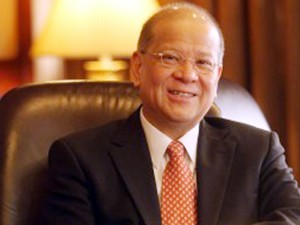SMC chief Ramon Ang now also PAL president
San Miguel Corp. has taken over management control of publicly listed PAL Holdings—the parent company of flag carrier Philippine Airlines—following a recent $500-million buy-in deal with the group of taipan Lucio Tan.
SMC took five out of 11 board seats, one of which was occupied by SMC president Ramon S. Ang who was also named president and chief operating officer of PAL Holdings, replacing long-time president Jaime Bautista, according to a disclosure to the Philippine Stock Exchange submitted on Friday.
Joining Ang as SMC’s representatives to the board of PAL Holdings were Iñigo Zobel, Roberto Ongpin, Aurora Calderon and Ferdinand Constantino who were elected on Friday.
As SMC bought 49 percent of PAL Holding’s holding companies, it took an indirect stake of at least 40 percent in PAL and budget carrier Air Philippines alongside management control.
A partial revamp of the management team was also announced on Friday with Harry Tan, the tycoon’s brother, named treasurer. Veteran lawyer Estelito Mendoza was named corporate secretary with Cecilia Pesayco and Irene Cipriano as assistant corporate secretaries.
Daniel Ang Tan Chai was elected chief finance officer of PAL Holdings.
‘Glory days’
“With SMC at the helm, expect major changes to bring back the glory days of the country’s flag carrier,” said Manny Cruz, chief strategist at local stock brokerage Asiasec Equities.
“This should be positive for PAL, this entry of San Miguel management in the day-to-day running of the airline. It has had a difficult period, with PAL plagued by rising oil prices, labor issues and an unfriendly, competitive environment with aggressive LCC (low-cost carriers) players like Cebu Pacific and Air Asia eating market share,” said fund manager Paul Joseph Garcia, senior vice president at Bank of the Philippine Islands. “This bodes well for PAL, which has a chance for a possible rebound in terms of gaining lost market share and being a more competitive airline.”
Good for PAL
Gregg Adrian Ilag, an analyst at AB Capital Securities, said the entry of SMC would be “good for PAL over the long term, given the new capital coming in.”
“On SMC not really sure if accretive to its earnings given the losses of PAL,” Ilag said, adding however that even if this buy-in deal would be funded by SMC with debt, the net asset valuation of the conglomerate won’t decline significantly. He said fair valuation post-PAL entry would go down to P181 from around P190 per share.
AB Capital’s net asset valuation per share of SMC shares was still higher than where the stock is trading at present. As of Friday, SMC shares closed at P112 per share, giving it a market capitalization of P266 billion
Fleet modernization
The five new SMC representatives to the board replaced the following: Bautista, former PAL treasurer Domingo Chua, Wilson Young, Juanita Tan Lee, Johnip Cua and former corporate secretary Cecilia Pesayco.
Ang earlier said PAL would undertake a fleet modernization program worth between $500 million and $1 billion following SMC’s infusion of fresh capital through the parent companies.
SMC is involved with the modernization of the Godofredo P. Ramos airport in Caticlan, the main gateway to the world-famous tourist destination Boracay Island. This is the first privatized airport terminal operations in the Philippines. SMC has also expressed interest to participate in the public bidding for the public-private partnership airport contracts of other airports.
The investment will be made by SMC through a wholly owned unit, San Miguel Equity Investments Inc. (SMEII). Under the agreement, Trustmark and Zuma Holdings and Management Corp.—the holding companies of PAL and Air Philippines—will issue new shares to SMEII.
PAL earlier got an imprimatur from Malacañang to spin off its catering, ground handling and call-center reservation units, making it easier for the airline to attract investors. The spinoff plan is a measure intended to stabilize PAL’s finances that continue to suffer due to the lingering effects of global recession.

